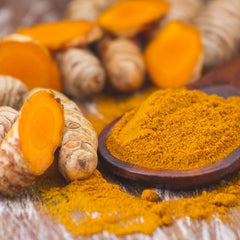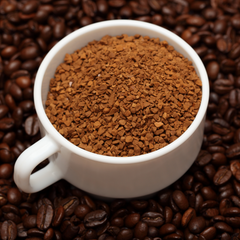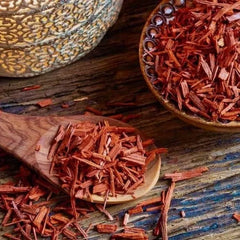What Does Lemon Balm Smell Like?
Click For Affordable Inspired Perfume Alternatives

Embark on a fragrant journey to the herb gardens and explore the delightful aroma of lemon balm. A member of the mint family, lemon balm, or Melissa officinalis, boasts a distinct fragrance that captures the essence of fresh citrus and soothing herbs. Join us as we delve into the question: What does lemon balm smell like?
What Does Lemon Balm Smell Like?
The fragrance of lemon balm is a harmonious blend of citrusy brightness and herbal freshness. Imagine the uplifting scent of lemon zest intertwined with the soothing aroma of mint. Lemon balm's scent is a celebration of the herbal family, offering a refreshing and calming olfactory experience.
Lemon Balm's Citrusy Zing
Step into the world of lemon balm, where the fragrance is a burst of citrusy zing. The first impression is a lively and invigorating citrus aroma reminiscent of freshly grated lemon peel. Picture the brightness of lemon, but with a unique herbal twist that sets lemon balm apart from other citrus scents.
Herbal Elegance: A Garden Stroll
As you approach lemon balm, the scent takes you on a tranquil garden stroll. The herbal elegance of lemon balm's fragrance emerges, with notes of mint and a subtle earthiness. The aroma is like a gentle breeze through a sunlit herb garden, offering a sense of calm and relaxation.
Minty Freshness: A Breath of Renewal
The scent of lemon balm carries a minty freshness that adds a breath of renewal to its profile. It's as if the herbaceous notes dance in the air, creating an invigorating and uplifting experience. The combination of citrus and mint contributes to a fragrance that is both energizing and soothing.
Subtle Sweetness: Herbal Citrus Harmony
While predominantly herbal and citrusy, there's a subtle undercurrent of sweetness in lemon balm's scent. This delicate herbal-citrus harmony adds depth to the fragrance, creating a well-balanced composition that is both refreshing and subtly sweet. Lemon balm's aroma is a delightful interplay of brightness and herbal nuances.
Lemon Balm's Garden Symphony
Hence, lemon balm's fragrance is a garden symphony of citrusy zing, herbal elegance, minty freshness, and subtle sweetness. It stands as a testament to the herb's versatile and harmonious qualities, offering a sensory experience that is both invigorating and calming. Lemon balm, with its refreshing and complex aroma, invites us to savor the natural notes found within its leaves, a fragrant journey that unfolds with every soothing whiff.
Factors Influencing the Scent of Lemon Balm Fragrance Oil
Lemon balm fragrance oil is crafted to capture the fresh and herbal aroma of Melissa officinalis. The formulation of this fragrance involves a thoughtful combination of aromatic compounds. Here are several factors that contribute to the vibrant and herbal scent of Lemon Balm fragrance oil:
-
Fragrance Composition: Lemon balm fragrance oil is a carefully blended mixture of various aromatic compounds, chosen to replicate the characteristic scent of lemon balm. This composition may include both synthetic and natural ingredients to achieve the desired olfactory profile.
-
Herbal Essence: At the core of the fragrance lies the essence of lemon balm. Notes of fresh citrus and herbal elements are intricately blended to mirror the uplifting and calming aroma of the herb.
-
Synthetic vs. Natural Components: Lemon balm fragrance oil often combines both synthetic and natural ingredients. Perfumers make choices to strike a balance between authenticity, cost considerations, and sustainability in the selection of these components.
-
Extraction Method: The method used to create Lemon Balm fragrance oil, whether through distillation or extraction, plays a crucial role in defining the aromatic profile. Specific extraction methods contribute to the faithful recreation of the fresh and herbal scent.
-
Additional Herbal and Citrus Notes: The fragrance may incorporate additional herbal elements or subtle citrus notes to enhance complexity. These complementary notes contribute to the overall vibrancy of the scent, capturing the essence of lemon balm.
-
Quality of Ingredients: The quality of raw materials, including the source of essential components, directly influences the freshness and authenticity of the lemon balm scent in the fragrance oil.
-
Perfumer's Artistry: The expertise and creativity of the perfumer or fragrance creator are crucial. Perfumers leverage their skills to balance different components, creating a distinctive and delightful lemon balm fragrance.
-
Regulatory Compliance: Adherence to regulatory standards and restrictions on certain fragrance ingredients is crucial. Compliance with safety guidelines requires careful consideration of ingredient choices to ensure the fragrance is safe for use.
-
Usage in Products: Lemon balm fragrance oil can be incorporated into various products, including perfumes, candles, room sprays, and bath products. The interaction with other ingredients in specific product formulations can influence how the lemon balm scent is perceived.
-
Product Type and Concentration: The concentration of Lemon Balm fragrance oil in a product affects the strength and longevity of the scent. Higher concentrations may be suitable for perfumes, while lower concentrations work well for candles, soaps, or room sprays.
-
Storage Conditions: Proper storage conditions for Lemon Balm fragrance oil, both before and after formulation, are essential to maintain its stability and scent. Storing it in a cool, dark environment helps preserve the freshness of the fragrance.
-
Consumer Preferences and Trends: Formulations of Lemon Balm fragrance may adapt to changing consumer preferences and market trends. The popularity of herbal or botanical scents may influence product formulations.
-
Artisanal vs. Commercial Production: Differences between artisanal and commercial production of Lemon Balm fragrance oil may impact ingredient sourcing, formulation, and overall quality. Artisanal methods may emphasize craftsmanship and unique blends.
-
Post-Formulation Processing: Additional processes, such as aging or filtering after the formulation of the fragrance oil, may influence the final scent and contribute to the desired characteristics.
Exploring different formulations of Lemon Balm fragrance oil allows consumers to experience a range of fresh and herbal scents reminiscent of the delightful herb. Individual preferences play a significant role in selecting the perfect Lemon Balm fragrance for various applications.
What to Look for When Choosing Lemon Balm Fragrance Oil
Selecting a lemon balm fragrance oil allows you to enjoy the uplifting and herbal aroma of lemon balm. Whether used in candles, diffusers, or personal care products, consider these factors to ensure you choose a high-quality and authentic lemon balm fragrance oil:
-
Herbal Authenticity: Seek a lemon balm fragrance oil that authentically captures the fresh, citrusy, and herbal scent of real lemon balm. Look for a fragrance that embodies the unique herbal-citrus notes characteristic of quality lemon balm.
-
Natural vs. Synthetic: Determine whether the fragrance oil is derived from natural sources or is synthetically produced. Natural lemon balm oils can provide a more nuanced and realistic scent, closely resembling the aroma of actual lemon balm.
-
Blend Ingredients: Check the blend of ingredients in the fragrance oil. A well-crafted combination of natural and synthetic components can contribute to a balanced and long-lasting lemon balm fragrance.
-
Intensity Level: Consider the intensity level of the lemon balm fragrance. Some may prefer a subtle and herbal scent, while others may desire a more pronounced and uplifting aroma. Look for a fragrance that aligns with your desired level of intensity.
-
Versatility: Choose a fragrance oil that is versatile and suitable for various applications. Whether used in candles, soaps, lotions, or diffusers, versatility allows you to enjoy the herbal-citrus scent in different settings.
-
Packaging: Assess the packaging of the fragrance oil. Opt for a bottle that is dark or opaque to protect the oil from light exposure, preserving its freshness and preventing deterioration over time.
-
No Residue or Discoloration: Ensure that the lemon balm fragrance oil leaves no residue or discoloration when incorporated into different products. A high-quality oil should seamlessly integrate into various mediums without causing unwanted effects.
-
Manufacturer Reputation: Research the reputation of the manufacturer or brand. Choose well-established brands with positive reviews, as they are more likely to produce reliable and high-quality fragrance oils.
-
Testing Options: Look for fragrance oils that offer testing options or sample sizes. This allows you to experience the scent firsthand before committing to a larger quantity, ensuring it aligns with your preferences.
-
Ethical and Sustainable Practices: Consider the manufacturer's commitment to ethical and sustainable practices. Brands that prioritize responsible sourcing and environmentally friendly production contribute to a more conscientious choice.
By considering these factors, you'll be better equipped to choose a lemon balm fragrance oil that not only aligns with your preferences but also ensures a high-quality and uplifting olfactory experience in your chosen applications.
Where to Find Reputable Lemon Balm Fragrance Oils
Discovering quality lemon balm fragrance oils enhances your aromatic journey. Consider these sources to find reputable lemon balm fragrance oils:
-
Specialty Candle and Soap Supply Stores: Explore specialty stores dedicated to candle-making and soap supplies. These stores often carry a variety of fragrance oils, including herbal scents like lemon balm.
-
Online Fragrance Oil Retailers: Browse reputable online platforms specializing in fragrance oils. Websites and retailers dedicated to aromatherapy, candle making, or DIY crafting may offer an extensive selection of lemon balm fragrance oils.
-
Artisanal or Handmade Markets: Attend artisanal markets or craft fairs where independent sellers showcase handmade products. Artisan vendors may create unique and carefully crafted lemon balm fragrance oils, providing an opportunity to explore distinct options.
-
Local Essential Oil or Perfume Shops: Specialty shops focusing on essential oils or perfumes may carry lemon balm fragrance oils. These stores often prioritize high-quality scents and may offer a range of herbal and botanical aromas.
-
Online Marketplaces: Platforms like Etsy or other online marketplaces featuring handmade or artisanal products can be sources for lemon balm fragrance oils. Look for sellers with positive reviews and detailed information about their products.
-
Aromatherapy Stores: Aromatherapy stores often carry a variety of fragrance oils for different applications. Inquire about the availability of lemon balm scents to add a herbal-citrus aroma to your living space.
-
Local Farmers' Markets or Herbal Shops: Check with local farmers' markets or herbal shops that specialize in natural products. Some of these establishments may offer fragrance oils with botanical scents, including lemon balm.
-
Specialty Perfume Retailers: Explore specialty perfume shops that focus on unique and exotic fragrances. These stores may carry lemon balm fragrance oils known for their distinctive and herbal-citrus notes.
-
Word of Mouth: Seek recommendations from friends, family, or members of fragrance communities for trusted sources of lemon balm fragrance oils. Personal experiences and suggestions can guide you to reputable suppliers known for quality and authenticity.
-
Check Ingredients and Descriptions: Before making a purchase, carefully read product descriptions and check ingredient lists for lemon balm fragrance oils. Authentic and reputable sellers provide clear information about the composition and intended use of their products.
Note: Lemon balm fragrance oils can bring a herbal-citrus note to your DIY projects. Ensure that the fragrance oil you choose aligns with your intended use, whether it's for candles, soaps, diffusers, or other creative endeavors. Follow safety guidelines provided by the manufacturer for proper usage.
20 Questions and Answers about Lemon Balm:
-
What is Lemon Balm?
- Lemon balm (Melissa officinalis) is a perennial herb in the mint family known for its lemon-scented leaves.
-
What part of Lemon Balm is used in perfumery?
- The leaves of lemon balm are primarily used in perfumery.
-
What is the main chemical compound responsible for the lemon scent in Lemon Balm?
- Citral is the main compound responsible for the lemon fragrance in lemon balm.
-
How is Lemon Balm essential oil extracted?
- Essential oil is typically extracted from lemon balm through steam distillation of its leaves.
-
What other essential oils blend well with Lemon Balm in perfumery?
- Lemon balm blends well with citrus oils such as lemon and bergamot, as well as with floral oils like lavender and geranium.
-
What type of fragrances is Lemon Balm commonly used in?
- Lemon balm is often used in citrus, herbal, and fresh fragrances.
-
Does Lemon Balm have therapeutic properties in addition to its fragrance?
- Yes, lemon balm is known for its calming and stress-relieving properties in aromatherapy.
-
Can Lemon Balm be used as a base note in perfumery?
- Lemon balm is typically used as a middle note due to its bright and uplifting aroma.
-
Are there any precautions when using Lemon Balm in perfumery?
- While generally safe, it's important to be aware of potential skin sensitivities, and a patch test is recommended.
-
Does Lemon Balm essential oil change over time in a perfume blend?
- Essential oils, including lemon balm, can undergo some changes over time due to oxidation and other factors.
-
Can Lemon Balm be used in natural perfumery?
- Yes, lemon balm is suitable for natural perfumery as it can be extracted without synthetic chemicals.
-
Is Lemon Balm commonly used in mainstream commercial perfumes?
- Lemon balm is not as commonly used in mainstream perfumes as some other citrus notes, but it can be found in certain niche and natural fragrance lines.
-
Can Lemon Balm be used in combination with spices in perfumery?
- Yes, lemon balm can be paired with spices like ginger or cardamom to create unique fragrance blends.
-
Does Lemon Balm have any cultural or historical significance in perfumery?
- Lemon balm has been historically used for its aromatic properties in various cultures, and its use can be traced back to ancient times.
-
Can Lemon Balm be used in perfumed candles or home fragrances?
- Yes, lemon balm is often included in candles and home fragrances for its refreshing and uplifting scent.
-
Does Lemon Balm have any color or viscosity variations in its essential oil?
- Lemon balm essential oil is typically pale yellow in color and has a thin consistency.
-
Can Lemon Balm be used in combination with other mints in perfumery?
- Lemon balm can be combined with other mints, such as peppermint or spearmint, to create complex and minty fragrance compositions.
-
Does Lemon Balm have any potential aromatherapy benefits in addition to its scent?
- Lemon balm is often used in aromatherapy for its potential to reduce anxiety, promote relaxation, and improve mood.
-
Can Lemon Balm be used in men's or women's fragrances?
- Lemon balm is versatile and can be used in both men's and women's fragrances, depending on the overall composition.
-
Is Lemon Balm used more as a top note or a heart note in perfumery?
- Lemon balm is commonly used as a heart note, contributing to the overall body and character of the fragrance.
Buy Perfumes - Best Online Retailers
Click For Affordable Inspired Perfume Alternatives
Click For The Best Niche Perfumes & Decants
Pheromone Perfumes - Confidence, Attraction & Appeal - Click For More
Home Fragrances & Candle Warmers - Click To Scent Up Your Spaces Today!



